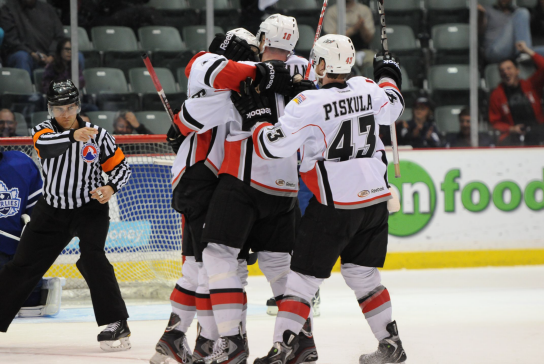By Michael Scoular (The Cascade) – Email
Print Edition: May 23, 2012
Up against the forces of bouncing pucks, untimely goals, and the Toronto Marlies, the Heat fell in five games, leading into an offseason that promises as much change as experienced in their record-setting year.
Abbotsford’s semifinal exit could be attributed to a number of factors, from their power play, which failed to connect on all 24 opportunities in the series, to their inability to sustain leads. All four losses came in a row, and in three of them the Heat held early leads.
But Troy Ward’s team won’t look at things that way. Ward has instilled his team with a mentality that doesn’t look at momentum or statistics for reasons or excuses. His thinking perceives the strength of the other team and the role of unpredictability in the series, and places the weight of responsibility not on individuals but the cumulative effort of the team.
So while scoring wasn’t in ample supply for the Heat, who were never able to beat Marlies goaltender Ben Scrivens more than twice in the series, there was also the fact that Scrivens played extremely well. Added to that, before and after the puck got to him, there was the Marlies’ strong group of defencemen; this impressive blueline was led by Korbinian Holzer and Mark Fraser, a pairing that consistently prevented most first and second chances.
Heat defenceman J.P. Testwuide commented, saying, “There were times we had them on the ropes, and Scrivens was there.”
Traffic, rebounds, and lucky bounces were where the Heat were going to have to find success, and that ultimately eluded them. When they did find a goal in that way, it was only because a rebound went right to Krys Kolanos – where before Scrivens had controlled every one. It didn’t happen again. The Heat were not outmatched, despite being the lower seed, and they certainly were not outcoached. Dallas Eakins—who was talked about as a possible candidate for the Toronto Maple Leafs’ head job this season, before Randy Carlyle was hired—called Ward’s team “the hardest we played all year.”
They were, as any team in a close matchup is, done in by the uncontrollable aspects of hockey and the brief lapses that turn into insurmountable advantages: the bounce that turns a power play into a breakaway for the other side, the chance taken for a big body check turned into an open lane. The Heat had those opportunities too, but could not execute, as the Marlies did on their series clinching overtime power play.
Despite the earlier than desired exit, the Heat were mostly optimistic about the team’s season, owing again to the culture that Ward has established in his first year as head coach, an important development going forward both for the on-ice success of the team and its off-ice reputation.
Ryan Walter, speaking on The Big Show on Calgary’s FAN 960, recognized the necessity of building a team that benefits from its connections to a big league club, but also has an identity separate from it, saying that the Heat “[need] to become Abbotsford’s team.”
One of the possible difficulties in establishing that kind of brand early on was that, in addition to being a Calgary Flames affiliate, in its first two seasons, the Heat played like it. Jim Playfair, who has gone on to have success with the Phoenix Coyotes as an associate coach this season, came to the Heat from the Flames, and brought that system with him.
Ward has changed the type of game the Heat play. If there’s an NHL team they resemble now, if not exactly in strategy but mentality, it’s the Nashville Predators, balancing out offensive deficiencies with hard work. Ward even made his top scorer a healthy scratch for the penultimate game of the Heat’s playoff run for what he’d only say were “issues.”
This stems from Ward’s approach to teaching, which stresses “being a good person first,” a method Testwuide said is among the many reasons why Ward is someone who “really, truly understands what it takes.” Captain Quintin Laing saw another benefit to this system. “When you have a head coach that cares about you as a person first, that makes you want to play harder and compete harder and win for the guy,” he said.
This differentiation from the Flames organization, whose workmanlike attitude has been corrupted by the underperforming, overpaid former stars leading them, is critical in establishing an identity, one that might prove more popular than the current rival and politically-fueled one that sees attendance refusing to grow to respectable numbers. But the ever-changing AHL environment could play its usual part in promoting those that perform well.
As the Heat finished their best season of record, the man largely responsible for that is being considered one of the most prominent candidates for the now vacant head coach position for the Calgary Flames.
The unanimous praise for Ward’s performance makes a convincing case, but the one thing to consider on the other hand is that the Calgary Flames are not in the same type of situation that usually sees the hiring of AHL-honed coaching talents elsewhere in the NHL. Kevin Dineen, Glen Gulutzan and Mike Yeo stepped into situations that saw an organization building, promoting some of the same players those coaches helped bring along in the AHL at the same time.
Flames general manager Jay Feaster has made it a point to shun the idea of rebuilding his club, signing players like Alex Tanguay and Curtis Glencross to long contracts and trading for another weight in Mike Cammalleri. So while players like T.J. Brodie, Lance Bouma and Paul Byron might become permanent members on the Calgary Flames roster, it’s not clear if moving further in the direction of development is the way Feaster wants to take his team.


